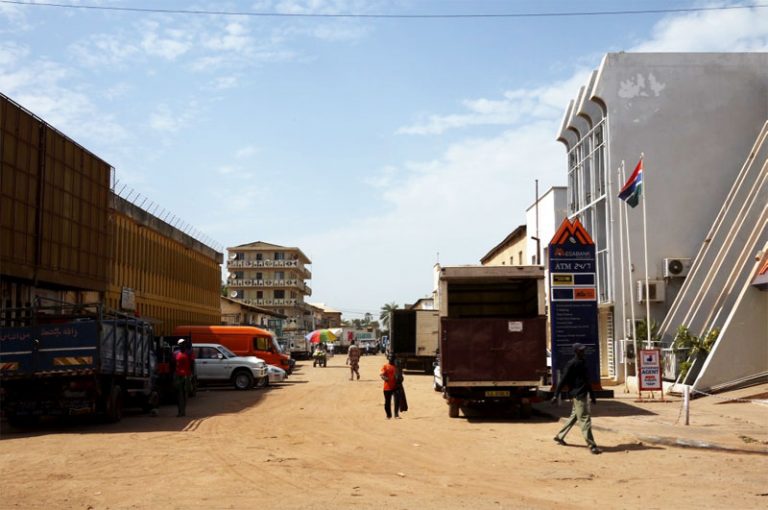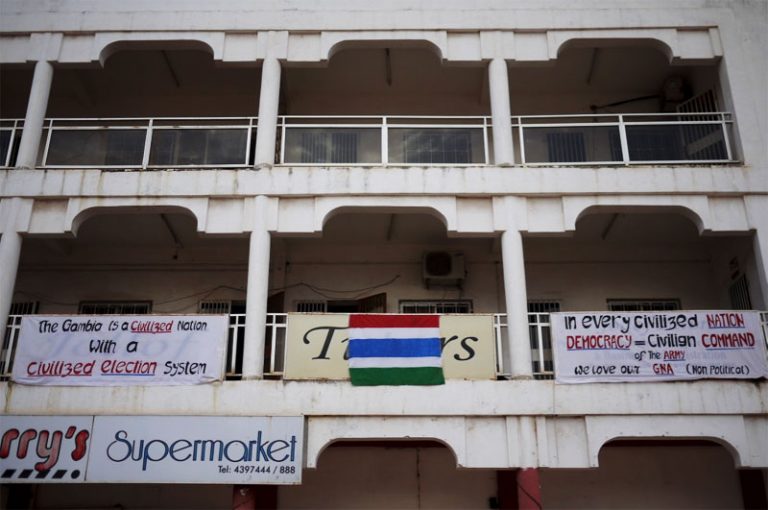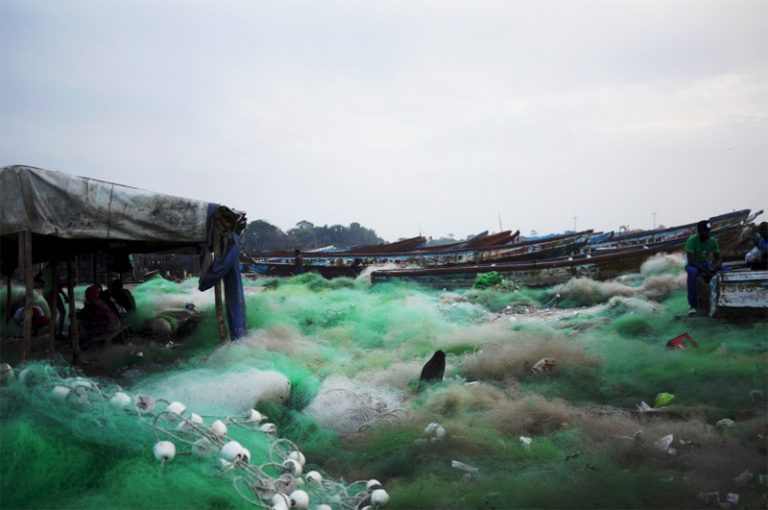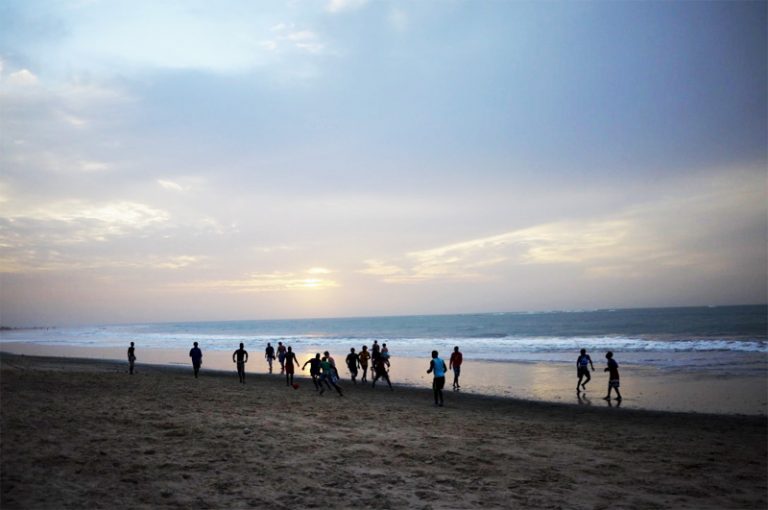The Gambia Emerges from Two Decades of Misrule
On 20 January, as the world watched Donald Trump assume power, another unpredictable, grandstanding president – the Gambia’s Yahya Jammeh – clung to the last threads of it.
After twenty-two years of thuggish rule, Jammeh sat isolated in the small West African nation’s State House as Senegalese troops crossed the border to ensure the succession of Adama Barrow, the opposition candidate who won a shock election victory last December. Under Jammeh, the Gambia became known both for the detention and disappearances of political opponents and journalists and its disproportionate role in the European migration crisis: in 2016, this country of less than two million people ranked third in arrivals of refugees and other migrants to Italy.
‘I knew Jammeh would never accept defeat,’ says Lamin Nijie, a 25-year-old former schoolteacher who fled his home near Banjul, The Gambia’s capital, and is now living in Rome. Jammeh, often rumored to suffer from bipolar disorder, initially conceded the election then, a week later, declared its result invalid. On 19 January, the new president was to be sworn in. Jammeh’s decision to linger gave those who’d grown to hate him one last jolt of fear, sending 45,000 temporarily into Senegal. The threat of a violent stand-off apparently gave him sufficient leverage to negotiate his exile: the Economic Community of West African States has promised him both immunity from prosecution and the right of return. Having pilfered the state for several luxury cars, a private jet and, according to varying reports, the equivalent of between $11 million and $44 million on the way out, the ousted leader is now in Equatorial Guinea.
‘Jammeh promised to turn the Gambia into a nation of refugees if he was not voted back into office,’ Nijie says. ‘Now he himself is a refugee.’
Nijie, a shy, earnest man not given to recriminations, sounds more rueful than celebratory. Under threat of arrest after his participation in an opposition rally in 2014, Nijie left the Gambia, traveled to Mali and Niger, and found work trading small goods across the Sahara into Libya. He was kidnapped by a roving band of criminals, rampant since the fall of Gaddafi, and held for six months in a shipping container in the desert. ‘When the sun hit,’ he says, ‘it was like hell.’ After his family paid his ransom, Nijie decided to go ‘the back way’, Gambian slang for illegal migration across the Mediterranean.
The back way has accelerated a trend that began in the 90s; the Gambian diaspora is as far-flung as Seattle and Malaysia, with significant pockets of expats in Canada and the UK (the Gambia won its independence from Britain in 1965). A decade ago, asylum seekers sailed to the Canary Islands to make their claims. In recent years, human smuggling routes across the Mediterranean have been favored. In Tripoli, Nijae paid a thousand euros to board a boat to Italy. It sank, and twenty-five people drowned. He was able to swim to safety. Eight months later, he tried again, finally landing in Sicily. In Rome he slept in parks and train stations before finding a place in a camp.
Nijae and others can now safely return home. But after such desperate journeys, will they? The fear of Jammeh may be gone from the Gambia, but what remains?

Compared to the vital, hectic atmosphere of Dakar, the nearby capital of Senegal, Banjul and its surrounding sprawl are markedly sleepy. The rest of the country, a slender strip of mangroves, semi-arid desert, and interconnected villages, extends up the Gambia River. Even in the more urban west, the rutted streets are all sand and dirt, and the few buildings above three stories are all Jammeh’s vanity projects, most of which sit empty. Few signs of the colonial era remain – the Portuguese and then the British traded slaves from the Gambia – though the country remains largely Anglophone. (Numerous tribal languages are also spoken.) Culturally, many Gambians look to Jamaica; rastas and reggae are everywhere. Social life feels both casual and intricate. Everyone, even soldiers, stops to shake hands and visit, greeting one another as ‘bro,’ ‘sister,’ ‘auntie’ and ‘pa.’
It can be hard to square this national affability with the brutality of Jammeh’s regime. Gambians listened to his speeches – in which he threatened the ethnic Mandinka majority (Jammeh is from the Jola tribe) with extermination and homosexuals with beheading – with a mix of disbelief, disgust and resignation. His secret police abducted, tortured and assassinated dissidents, but it was the dictator’s flamboyant proclamations that drew wry world headlines: Jammeh had ‘cured’ HIV/AIDS with a mysterious green paste and bananas; Jammeh had vowed to rule for ‘a billion years’; ‘Only Allah’ could remove Jammeh from power. Last November, it was rumored the erratic leader had ordered the kidnapping and ritual sacrifice of seventy school children, ten from each of the country’s regions, to ensure election victory. Parents were so terrified many schools closed. Jammeh seemed capable of any absurdity, but nothing, it seemed, could be done about him.
His distended rule warped every aspect of Gambian society. The economy is severely underdeveloped, government failure to create adequate seed banks during droughts has crippled agriculture, and foreign aid dwindled in the 90s as Jammeh’s human rights record caused NGOs to pull out. Corruption is rife. Exiting the airport, I was shaken down by police for 1,000 dalasi (about £18). Vice is not just explicit, but a way of life. In beachside restaurants and nightclubs, middle-aged British and Scandinavian men sit with local girls on their laps. More discreet are the white women paired off with much younger African men, locally known as ‘bumsters.’ When one weds a European, the other bumsters come out to cheer him; the groom will soon have a marriage visa and be gone.
Jammeh’s supernatural predilections also weakened the country’s healthcare system, as he instead funded and patronized faith-healing centres. In a dusty village an hour from Banjul, hundreds line up to see Adama Dalasi, a popular Islamic healer. Like Jammeh, Dalasi, thirty-two and baby-faced, says he can cure numerous ailments – diabetes, near-sightednesss, sickle-cell anemia – through herbal remedies and prayer. Many see him simply because they can’t afford conventional care. Dalasi’s adopted last name refers to the fee he charges, one dalasi (about a penny). Though he does accept donations, he informs me.
Education, too, suffered under Jammeh, with policies designed to make the government look good without effecting real improvements. Grades on national tests were inflated; when it came time to take West Africa-wide exams, most Gambian teenagers failed. During political campaigns, schools lost a full day almost every week preparing to welcome presidential delegations, often waiting for hours along the road just to wave as Jammeh drove by. ‘And if teachers weren’t participating,’ one secondary school principal says, ‘they’d have a problem.’

‘Jammeh alienated everyone,’ Ousainou Darboe, the long-time leader of the opposition United Democratic Party, tells me. At sixty-eight, Darboe, slight and dignified in a long blue robe, is revered nationwide as ‘the Mandela of the Gambia.’ I spoke with him in his neatly-tended rose garden. ‘Jammeh alienated Mandinkas, the Christian community, everyone,’ Darboe says. ‘We reached out, especially to women. More women than men voted in this election.’
Darboe ran for president in 1996, 2001 and 2006, losing each time in elections widely thought to have been rigged. He was also the UDP’s original candidate in 2016. ‘Jammeh miscalculated by using force against us,’ Darboe says, referring to his arrest last April – Darboe and eighteen other members of the UDP executive were jailed for protesting the death in captivity of Solo Sandeng, their party secretary.
These en masse detentions – Darboe and the others have since been released – suddenly thrust Adama Barrow, the UDP’s treasurer and a political novice, to the top of the ticket. ‘It was the biggest moment in my life!’ Barrow says of winning the election, still seeming surprised. In the early 2000s, he worked as a security guard in a north London Argos while studying real estate. In person, Barrow is genial, if tentative, and comes most alive when talking about his rental properties – he estimates he has 3,000 tenants – and about Darboe, whom he calls an ‘inspiration’ and a ‘mentor’. During the presidential campaign, Jammeh made another miscalculation: By arresting the Gambian Mandela, he perhaps intended to cripple the UDP. But Darboe’s disagreements with the head of another party had kept an effective coalition from forming. Barrow’s anonymity made it easier for the opposition to unite.
‘Barrow is an accidental leader,’ says Salieu Taal, the former president of the Gambian Bar Association, now an activist advocating for civil society reforms. He printed the ‘#GambiaHasDecided’ T-shirts seen widely online during the mass calls for Jammeh to step down. Taal is outspoken and confident of his opinions. ‘Barrow is not assertive,’ he says. ‘Darboe will be controlling him.’
Taal sees fault lines in the coalition, especially between its socialist wing and the UDP, who prioritize business development. ‘The coalition is a demolition team,’ Taal says. ‘They came to demolish Jammeh. But what will they construct?’ He points to the need for constitutional reform, rule of law and an independent judiciary. ‘If the coalition focuses on anything else,’ Taal says, ‘they will fail.’

Darboe is also concerned about those tempted to go the back way. ‘It’s important to deal with all the factors that push our young people abroad,’ he tells me. Political and economic forces have gone hand in hand. Many young Gambians, young men especially, feel intense pressure from their families to go to Europe, where, even jobless, they can make significant contributions. Since 2008, foreign remittances to the Gambia have shot up from 7 per cent of the GDP to almost 25 per cent. Most EU countries give asylum seekers a weekly allowance of €20–40, much of which gets wired home.
Emigration has hollowed out entire regions of the Gambia. At Tanji, where fishing boats come in, it’s women who bring the catch to shore, where boys and older men wait with wheelbarrows to transport it. ‘The young men from Tanji, they say they’re going out fishing,’ the proprietor of a fish-smoking business tells me. ‘The next thing we hear they’re in Italy.’
‘A lot of our young people lost faith,’ Darboe says. ‘They’ve lost confidence they could live here safely or have secure employment.’ Jammeh did little to discourage those tempted to go the back way, perhaps aware that the young and ambitious, and those, like Nijae, drawn to opposition politics were less of a threat outside the country. ‘It’s likely those who haven’t been absorbed into European society will come back,’ Darboe says.
When Barrow won, Taal tells me, school children went out in the street singing, ‘No more back way! No more back way!’ He is more skeptical. ‘How do you control these young people’s aspirations?’ Taal says. ‘They think their lives will change overnight.’
Taal is the son of the former Gambian ambassador to the EU, and was educated in the UK. He worked on Fleet Street before returning to the Gambia at twenty-eight to help start a bank. ‘I was making in a month what I’d make in a day in England,’ he says. ‘But I was part of building something.’ Gambians in exile would have to consider similar compromises between patriotism, family and finances before returning.

In Italy, after a year of struggle, Nijae has found a small foothold in Europe and is taking courses at a university in Rome. Once he finishes his studies, he plans to return home and hopes to work in government.
When he saw a tweet from Barrow saying Jammeh had finally agreed to leave, Nijae wanted to celebrate. But among the Gambians gathered at his camp was at least one Jammeh supporter. The former president still has a strong base among the Jola minority, many of whom he installed in high-ranking military positions. At Jammeh’s ceremonial departure from the Banjul airport, he had more supporters than anticipated, and many soldiers openly wept. For now, Barrow’s security detail remains largely Senegalese, a sign of the new administration’s mistrust of their own military and the possibility that their loyalties remain with the former president. From Equatorial Guinea, Jammeh claims he wants to return to his home village to take up farming. Many Gambians hear these statements and shudder.
‘I feel relieved,’ Nijie says of the dictator’s long-awaited departure. ‘But there are still people ready to die for Jammeh.’
Given political stability, the Gambia should open again to international aid and development, and economic growth would likely bring many home, removing a burden on the southern European countries accepting huge numbers of refugees and other migrants. But with the economically isolationist Trump administration’s skepticism of previous commitments to Africa, and an EU External Investment Plan for Africa imperiled by the rise of far-right movements, that aid may not be coming at all. For many Gambians, the back way may yet be the only way.
Photographs courtesy of the author







